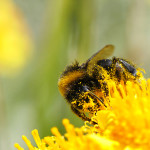
More than two-thirds of the pollen that honeybees collect from European fields is contaminated by a cocktail of up to 17 different toxic pesticides. These are the shocking findings of a new study released yesterday.

In addition to pesticides-related chemicals, the report also identifies substances used in insecticides, acaricides, fungicides and herbicides, produced by agrochemical companies like Bayer, Syngenta and BASF. To mark the release of the report and protest against the chemical industry’s role in bee decline, more than 20 activists unfurled a giant banner outside the headquarters of Bayer, in Germany.
The study, The Bees’ Burden: An analysis of pesticide residues in comb pollen (beebread) and trapped pollen from honey bees, is the largest of its kind, comprising more than 100 samples from 12 European countries. In total 53 different chemicals were detected.
The study is a snapshot of the toxicity of Europe’s current agricultural system. It demonstrates the high concentrations and wide range of fungicides found in pollen collected around vineyards in Italy, the widespread use of bee-killing insecticides in pollen from rape fields in Poland, the detection of DDE—a derivative of DDT—a pesticide banned decades ago, and the frequent detection of the insect nerve-poison Thiacloprid, a neonicotinoid, in many samples from Germany.
“This study on contaminated pollen reveals the unbearable burden of bees and other vital pollinators,” said Matthias Wüthrich, a Greenpeace ecological farming campaigner. “Bees are exposed to a cocktail of toxic pesticides. This is yet more proof that there is something fundamentally wrong in the current agricultural model which is based on the intensive use of toxic pesticides, large-scale monocultures and corporate control of farming by a few companies like Bayer, Syngenta & Co. It shows the need for a fundamental shift towards ecological farming.”
The report confirms the findings of a recent study carried out by the European Food Safety Authority (EFSA). In its study, EFSA acknowledges vast knowledge gaps related to the health of bees and pollinators, including on the effects of chemical “cocktails,” and calls on the EU and national governments to fill this gap with further scientific investigation.

In light of its findings on pollen contamination and following EFSA’s recommendations, Greenpeace calls on the European Commission and policy-makers across Europe to:
Extend the scope of restrictions already imposed on the use of certain pesticides harmful to bees, namely clothianidin, imidacloprid, thiamethoxam and fipronil, so that their use is completely banned.
Fully ban all other pesticides harmful to bees and other pollinators (including chlorpyrifos, cypermethrin and deltamethrin).
Set ambitious Europe-wide action plans to better assess pesticide impacts on pollinators and reduce their use.
Encourage research and development of non-chemical alternatives to pest management and promote the widespread implementation of ecological farming practices on the ground.
——–
YOU ALSO MIGHT LIKE
15 Plants to Help Save Bees
Half a Million Americans Urge EPA to Protect Bees
EPA Approves Another Pesticide Highly Toxic to Bees
——–
[source: http://ecowatch.com/2014/04/17/two-thirds-bee-pollen-contaminated-pesticides/]

Leave a Reply
You must be logged in to post a comment.